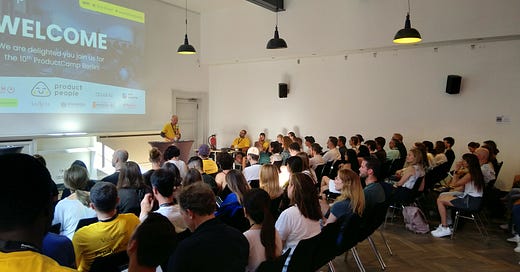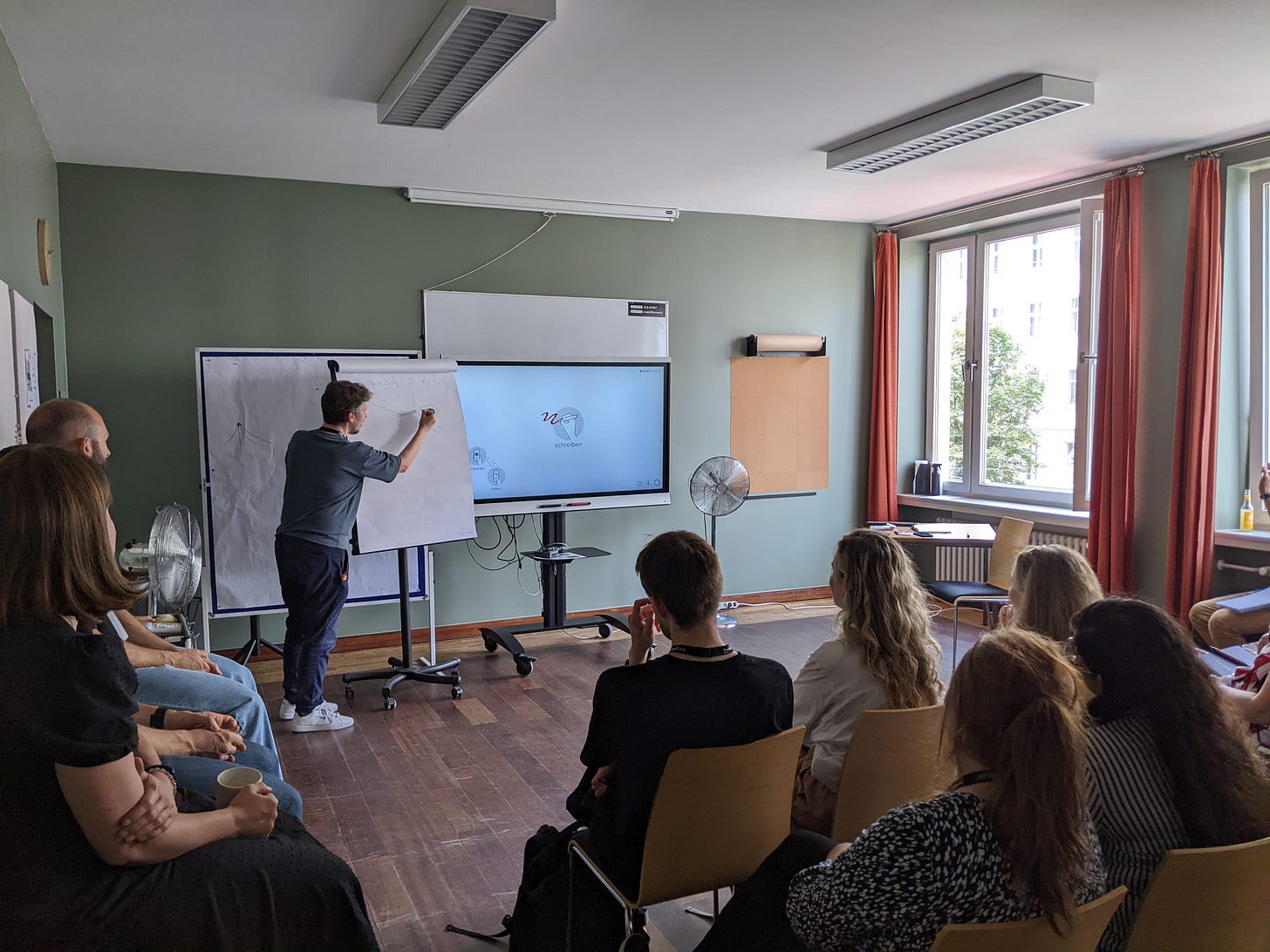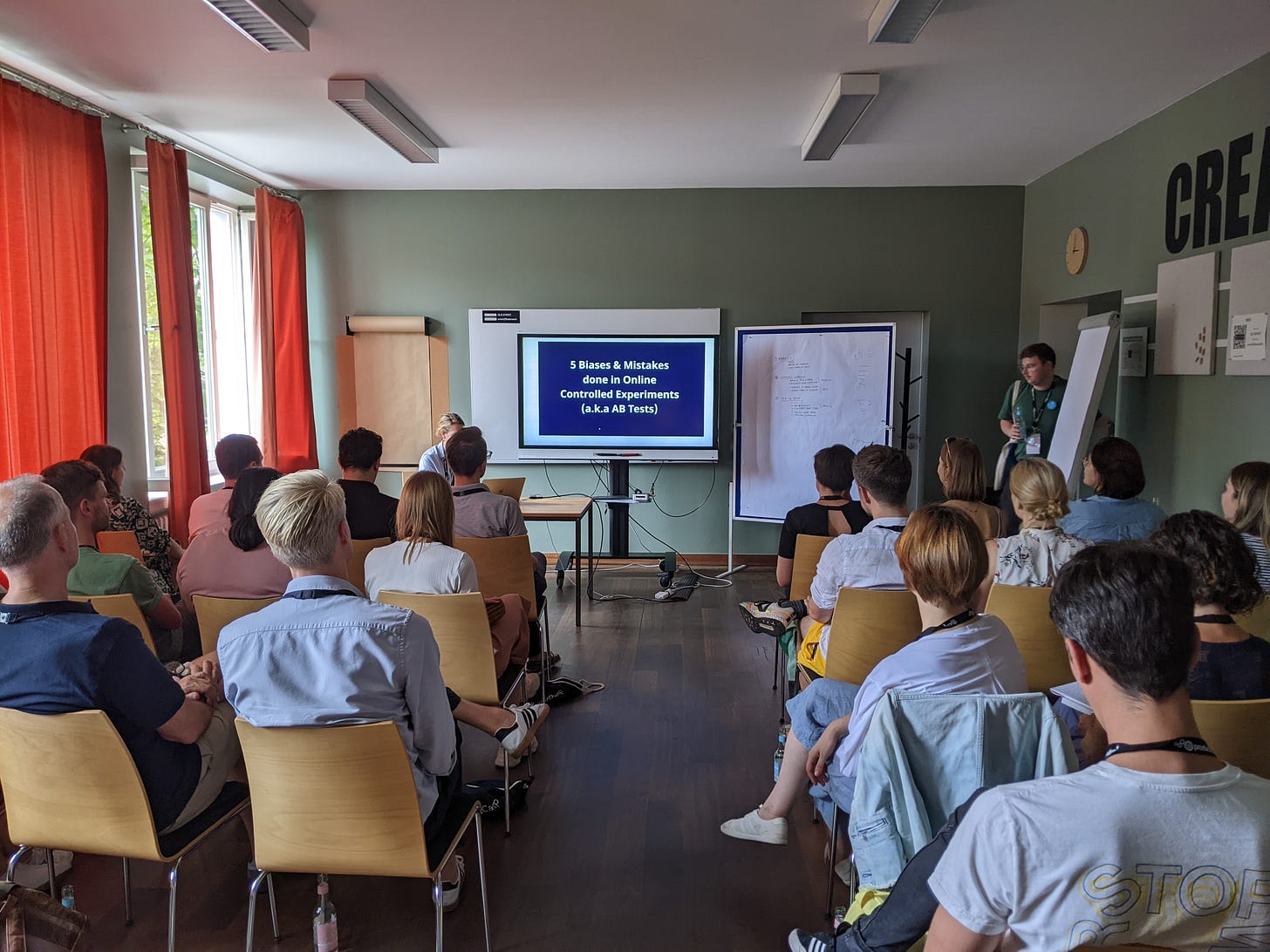ProductCamp Berlin '23 - unConference Takeaways
My scribbles on the napkin on all things product, people and the processes.
This was my second year attending the most unconventional unсonference for product folks. Last year, I was so impressed that I signed up as a volunteer.
Also, I have never taken part in the organisation of the unconference, so take it all with a grain of salt; it was pretty exciting in itself and I am biased.
The battles conducted by product folks are pretty much the same no matter where you come from (physically or domain-wise) but the approach to handle those can be very different.
I feel like our Product Culture in CEE generally lacks empowerment, basic economic understanding and creativity.
We are those silent operators, the managers of the factory, the butlers - if you wish - and there is not much we are expected to change.
The PM is a glorified Project Manager who is expected to deliver a particular X within the Z timeframe (on a budget, if possible, which is rarely done).
Our opinion rarely matters because we often just oversee the products built for other countries, ‘billed’ and ‘coordinated’ out of those respective regions.
The dreams of some agency are pleasant to discuss and read about, but we aren’t really there.
We are expected to build features at best and it slightly reminds me of the collective plans we still had back in the 60s: 5-year plans with no adjustments on the customer or the state of our market.
The delivery matters.
It is a justification of our existence.
I presume this goes for weak-headed companies of the West too but I really hope their share is much lower.
The pressure on PMs is so intense at times that we seek therapy and pills. Or we leave the job for good after we’ve had enough.
Really. I have discussed it with many PMs (and POs, for that matter), and the problem gets to you sooner or later. If you are a good PM, the burnout is guaranteed cause you just care too much about someone else’s business.
If you don’t, you won’t get high cortisol levels and insomnia but you will be average as fuck. No one wants average (the average companies do), so pick your poison.
I am seeing PMs doing therapy a lot.
That’s not to say lots of people need therapy in the first place, but the number of PMs burdened by it is unbelievable, especially in the West (here: Western Europe).
The technical vs. non-technical conundrum is real.
If you are a non-technical PM, you end up overpromising and hyping over every new feature or idea.
If you know how the system has been constructed and what code has been written (or a higher level - what microservices are out there) - you end up being shortsighted and biased in favour of quick solutions from your team’s active scope (aka ‘stuff you know well’) - the ‘everything is a nail’ kind of problem.
Admittedly, I haven’t seen many technical PMs yet but a limited number of technical POs leading the component teams makes me think the problem is really there. After some 100+ bricks are laid in place, you don’t think about windows and/or lovely sculptures, or sun access through the balcony. Oh no, you keep building walls.
Same as the guy who’s brought up the topic (hey Kirill from Berlin ;), I can relate to the feeling of being stuck with both hands holding the bricks I am supposed to be laying. Stepping back and taking a look at the battlefield holistically is a hard thing to do when under the pressure of quarterly commitments.
The
GermanBerlin product scene, while quite conservative, is much more advanced than anywhere else in Europe.
There is much more HIPPO here, first-generation capital, conventional speaking out here. It is basically challenging to build up a career to be useful in any other place than CEE. We both know that our life’s projects define us and our economic utility. The complexity of the challenges of the past makes sure we become prudent and reliable in the future (should be paid well too). If all you did was laying bricks (metaphorically or literally) - you end up stuck in the same place. No one wants to marry the B-players.
I am definitely missing the diversity Berlin has to offer.
This one is personal. We all talk about the diversity of lifestyles and thinking. But I am definitely lacking it in Warsaw.
The diverse crowd of London and Berlin is mesmerizing in its own right. The wisdom of the crowd, while often incorrect, allows for a broader variety to listen to. Variety of views. Variety of ideas. Variety of backgrounds.
Volunteering embodies crafting an experience as a product in itself.
A complex machine that ensures retention the very next year (both attendees and sponsors supporting the event).
Every view, question answered or a ventilator enabled (it was around 27 C that day with no AC in the building) creates an experience somewhat close to that of the hospitality industry.
Fortunately, there was no work needed for us as bouncers but everything was foreseen.
Given the cost & nature of the meeting we ended up having the best audience ever, respectable and willing to engage on that particular day.
You don’t want the conference to grow too much.
At some point, it spills over the top of the glass, leaving some of the attendees with uncatered needs yet another meetup couldn’t satisfy. Scarcity is good.
Arguably, it would be hellishly hard to handle with more than 300 people.
The concept of the bar-like conversation and no pre-event timeline means there is a big window for attendees to pitch their talk and get a shot at presenting the idea/leading the panel. Everyone is welcome.
(sorry, I can’t recall who’s taken this picture, dear volunteer X).
The majority of talks or panels held are there to learn from each other; the majority isn’t there to sell.
While you have got more prominent companies’ folks presenting - those are rarely selling the service but trying to recruit you (you don’t have to attend, though, as the quality of the talk is at times lower than a simple bar-like chat like the one proposed by Kirill).
EuropeansBerliners are living under the rainbow and never stop wearing pink sunglasses.
I wasn’t sure whether I should be adding this statement but it wouldn’t be full otherwise. A lot of folks I have met were extremely bullish about the “AI” (LLMs even though no one understands them), ‘making humanity better and prosperous’ and this kind of nonsense.
Some of them believe they are actually doing something useful for the humanity. Some of them don’t (the jaded ones).
For example, I have accidentally landed at the session where we were expected to write down things we want improved in the future (in 20 and 30 years). Please reread the sentence; what we want ‘improved’ as in ‘happens by itself’.
So people wrote down things like ‘lower or no taxes’, ‘green energy’, ‘happiness’ and ‘diversity’.
All of those being symptoms/signs of the underlying issues we are seeing (or we are led to believe and see). No one expressed any fundamental things like better education, global governmental bodies, system thinking and engineering as a basis for the future of humanity (given our ugly fertile future with lots of retired folks per 100 youngsters).
I was looking at those and realised that as long as PMs avoid looking at the macro and educating themselves… nothing good will ever come out from the Product Management. We are engineers, for God’s sake, we live systems and frown upon fixing symptomatic leakages with the ducktape duct tape.
God help us as we are too stupid to see what’s coming.










Agree with every observation and point.